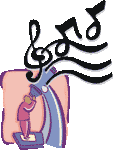When I read the following article, I was reminded of a story told to me by a very intelligent Alabama boy who went to Harvard and to Stanford Medical School. He said that at a school board meeting in the South, a debate raged about whether or not to teach foreign languages in high school. One exasperated parent in the audience finally jumped up and yelled, “If English was good enough for Jesus Christ, it’s good enough for me!”
It is this kind of fundamentalist, evangelically militant ignorance, that Scientific Gospel hopes to dispell.
This next topic was seen in the North County Times based upon an article by Eileen McNamara of the The Boston Globe. Not only does this prove the necessity for Scientific Gospel to spread the word of rationality and responsibility for one’s behavior in the ‘here and now,’ but it is a sad commentary on a whiney generation who have learned from their parents and corporate America to complain, be litigious, and abrograte responsibility for their own action.
Students always balk at the study of history. More even than geometry, history suffers the disdain of the teen-age relevance police.
As an exasperated adolescent query, “Why learn about guys who have been dead for 100 years?” is an even more common dinner table challenge than “When am I ever going to need the formula for the hypotenuse of a triangle?”
The Massachusetts Board of Education Tuesday guaranteed a pandemic of parental indigestion among those of us who have tried to convince our children that history is not just an arbitrary assemblage of names and dates, but a tool for understanding the world and their place in it.
The state’s educational policy makers voted to scrap their own requirement that public high school students be tested on their knowledge of world history. The rationale for the reversal was the history of civilization covers too much time and too much territory. Better we test students on their knowledge of the United States, a manageably compact place with a blissfully brief history.
So, after school districts have turned themselves inside out to conform their curriculums to the state’s rigid world history frameworks and teachers have redesigned their lesson plans, the state Board of Education now says it would prefer that children demonstrate a command of American history, instead. Passing tests in mathematics and English will be required to graduate in 2003; passage of an American history test will be phased in later.
No one would disagree that an educated citizenry should know the roots of our democratic institutions and display a command of the pivotal events that built the nation. We have all read too many surveys of high school graduates who think that the Civil War occurred in the late 20th century and that the first atomic bomb was dropped at Yorktown.
But the vote is also a window into all that is wrong with the nation’s current infatuation with high-stakes educational testing. What, exactly, are we testing for? Are we asking for a demonstration of analytical thinking or the rote regurgitation of memorized material? It it’s the latter, and we have simply substituted a demand for knowledge about Reconstruction for knowledge about the Russian Revolution, how can we argue that what we expect our children to know is not arbitrary?
The best teachers know what Henry James knew, that “history is never, in any rich sense, the immediate crudity of ‘what happpens,’ but the much finer complexity of what we read into it and think of in connection with it.” That’s a subtle concept to capture on the multiple choice questions that are the heart and Achilles heel of the Massachusetts Assessment System tests.
Abigail Thernstrom, a board member, says the switch from testing for knowledge of world history to American history is simply a matter of priorities, that it is more important for students in the United States “to know who Thomas Jefferson was than to know about the Ming dynasty.” I suppose that depends on what they learn about Thomas Jefferson. Will they learn that history is made by Great Men who shape their times or that it is shaped by social and economic forces that mold the men who lead?
“A true account of the actual is the rarest poetry,” Henry David Thoreau wrote, and it is that uncertainty I hope my children learn from their history teachers. I want them to learn that it is possible for Jefferson to have been a utopian as well as a slave owner, that John Adams might have been a pompous little artistocrat and an accomplished statesman, too.
But the Ming Dynasty offers its own lessons for the test-givers as well as the test-takers. An overreliance on memorization prompted the ruler K’ang-hsi to read the civil service exams himself. According to historian Jonathan Spence, he was searching for signs of independent thought.
